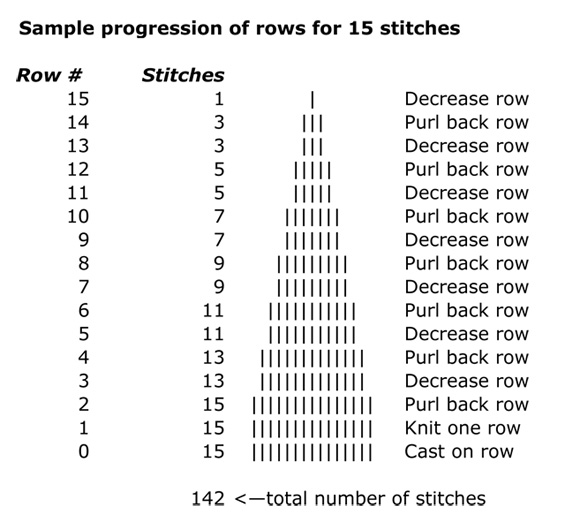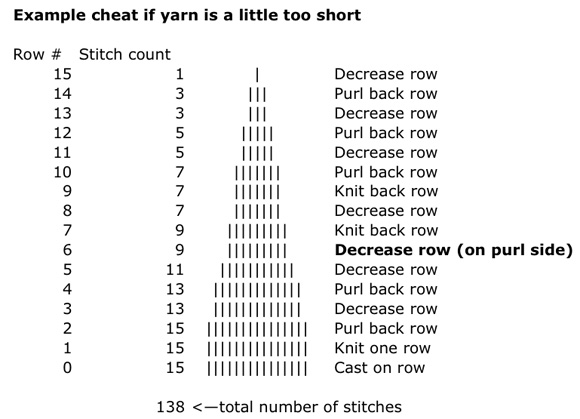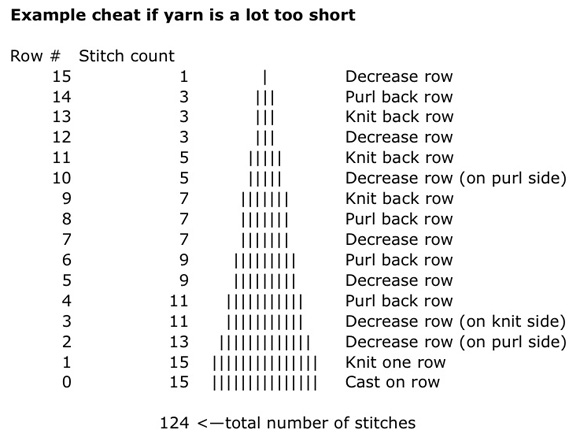
|
|
|
|
I love yarn, and I love colour. Handpainted yarns combine
those two loves in a wonderful way. I have a collection of
handpainted yarn that I fondle and want to put into a picture
frame on the wall. So I wound up the ball and started swatching. I cast on a few stitches and tried a mitered square, and it turned into a perfectly framed miter, with the purple on the long side, and the yellow and white on the inside. This turned into a wee-hours project, as I did “just one more square” until I’d finished an entire sock cuff in less than two days. (This is now the Mitered Windowpane Socks, a pattern that’s written up for free on my blog.) I loved the way the yarn pooled and made the colours so much more intense and vivid. By figuring out the average length of one colour repeat in your skein of yarn, you can build these mitered square “building blocks” into all sorts of knitted items — sock, mitten or sweater cuffs, hat brims, or sweater edgings. Making a mitered square Here’s a chart for how to proceed on each row of a 15-stitch mitered square. If you cast on more or fewer stitches, adjust accordingly.  (Above: Socks that Rock, 15 stitch mitered square, on
US 1 needles) And sometimes you’ve miscalculated and you need to adjust your square by a lot of stitches. This sample cheat saves you 18 stitches worth of yarn.
And if you find yourself in the reverse situation, with a little too much yarn for the next square, here’s another cheat chart for using up the yarn to get you aligned for the next square.
There are many handpainted yarns in the marketplace, and they won’t all turn into “windowpanes.” I’ve swatched up a few samples for this article, and taken photographs of the skein and the resulting squares to help you figure out how to work with the yarn and the colours that you love. I find that yarn with strong colour contrasts makes the most interesting mitered squares. And sometimes, as you’ll see below, you don’t have to find the “magic number” for your yarn to get a very interesting set of colours and textures. Lorna’s Laces Worsted, size 5 needles, 15 stitch squares Malabrigo Silky Merino in Vigo colourway, size 5 needles, 15 stitch squares Malabrigo Sock in Caribeno, size 0 needles, 17 stitch square on top, 15 stitch square on bottom. Sometimes you don’t need to get the skein repeats to align to get a really interesting look. Lorna's Laces Shepherd Sock Multi, in the rainbow colourway. 15 stitch miter on a size 0 needle. Again, the repeats didn’t align here, but the rainbow colours pop so much more vividly on this sock cuff than in the rest of the foot. Wollmeise Sockenwolle 100% superwash, in Krauterbeet. 13 stitch miter on a size 0 needle.
|
| ABOUT THE AUTHOR |
|
Gladys We is the knitting eccentric in her family. She
lives in a suburb of Vancouver,
BC, and knits during her
commute, while chasing
her two boys around, and
pretty much anytime she’s awake.
She’s grateful that her boys lend her their Tinkertoys when she needs a swift, and she blogs when she can. |
| Text & images © 2009 Gladys We. Contact Gladys |



